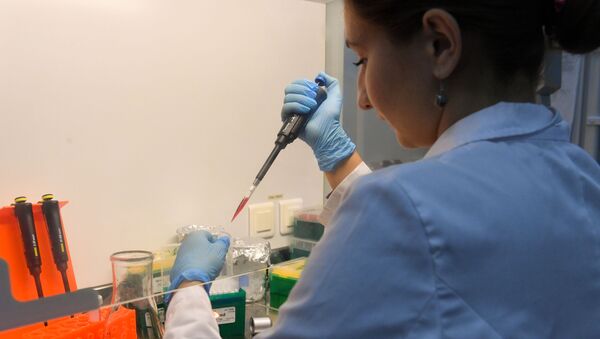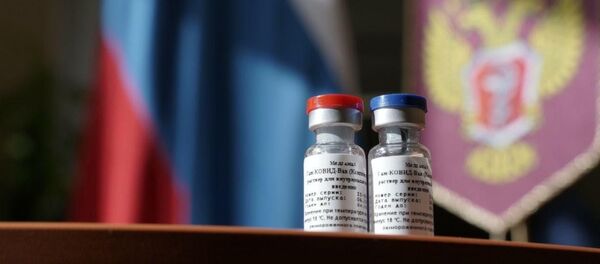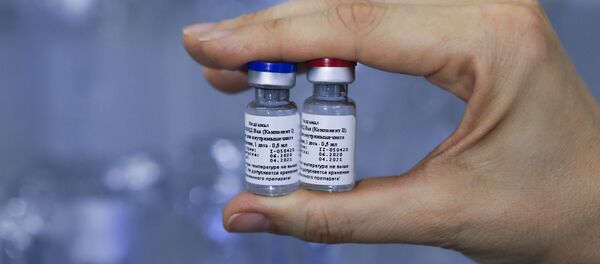Sputnik has spoken to Denis Logunov, deputy research director at the Gamaleya Centre, to learn more about the scientific research into the Russian coronavirus vaccine, which will be published shortly in international scientific journals.
Logunov revealed how they managed to create the vaccine so quickly, although it usually takes at least 1.5 years, and explained the vaccine is unique because it uses two adenoviruses, the 5th and 26th.
Sputnik: Last Sunday you submitted the results of clinical trials to the Russian Ministry of Health. The results haven't been published yet. What are the main findings of these studies?
Denis Logunov: We have conducted a full range of preclinical studies on the vaccine's safety and efficacy, which were followed by two clinical studies that examined the vaccine in terms of safety and immunogenicity involving healthy volunteers. Based on the results of these studies, the vaccine showed a good safety profile and high immunogenicity. Speaking about specific indicators and numbers achieved, the volunteers' average geometric titer of antibodies reached more than 1 in 14,000, nearly 1 in 15,000. One hundred percent of the volunteers had seroconversion.
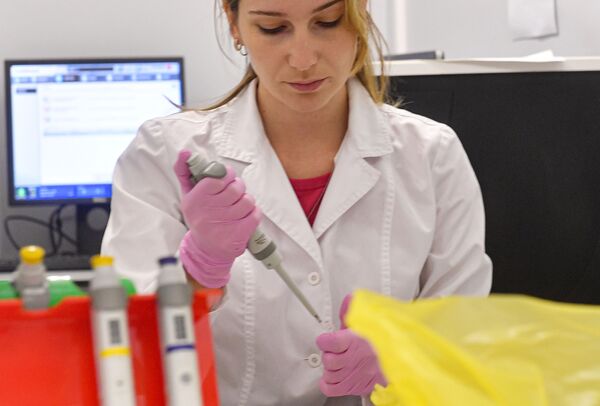
Seroconversion is when a person's antibody titer increases more than 4 times compared to the initial, background values. Humoral immunity parameters were also assessed via a virus neutralisation reaction, that is, the virus's direct inactivation by antibodies.
Virus neutralising antibodies have been found in all the volunteers immunised with our vaccine, both when using the dry and the liquid forms of the vaccine. Various cellular immune response indicators were also analysed, in particular, cytotoxic lymphocytes, which is a very important antiviral immunity parameter.
Cytotoxic lymphocytes, which remove virus-infected cells from the body, have been found in all the vaccinated volunteers. Thus, the vaccine has shown very good results in terms of immunogenicity. As for safety, the expected adverse events in the form of temperature and pain at the injection site weren't observed in all the volunteers. These specific numbers will be published shortly.
Sputnik: How many people were involved in the first and second phases of testing?
Denis Logunov: The first and second phases involved 38 people each, a total of 76. The two protocols differed in that the vaccine’s active substance was the same, but its physical state was different. One form was freeze-dried, the other was frozen. There was one active substance but two forms of the vaccine. That is why there were 76 people.
Sputnik: What was the age range of the participants?
Denis Logunov: Volunteers for the first and second phases were recruited from the 18-60 age group.
Sputnik: Media outlets have repeatedly said that it takes at least a year and a half to develop a safe and reliable vaccine. Could you explain how the scientists at the Gamaleya Research Centre managed to create a vaccine so quickly, literally in 5-6 months?
Denis Logunov: It would be wrong to say that we've managed to create a vaccine from scratch in a short time. Four decades have passed since adenoviral vector technology was introduced into practice. Over these four decades, a technological platform was created that has been tested on tens of thousands of people, both on the basis of the 5th and the 26th serotype vector. Since 2015, more than 3,000 people have been vaccinated with adenoviral vector-based vaccines developed at the Gamaleya Centre. Therefore, it was not a 5-month effort in any way, but work over several decades.
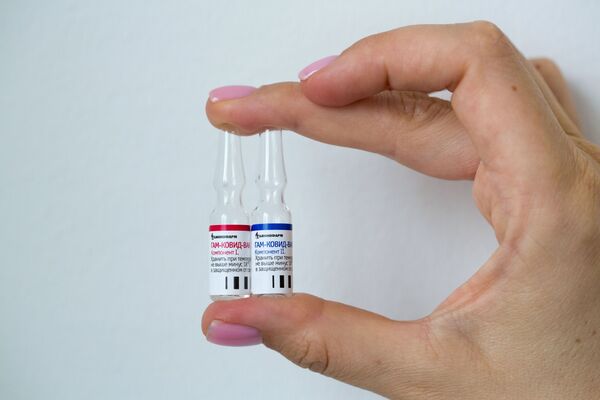
Adenoviral vector-based vaccines were not only created in Russia. China, CanSino, and Johnson & Johnson are also working with adenoviral vectors. First of all, it’s about developing vaccines against Ebola. These platforms are well-known and well-studied in clinical trials. Apart from clinical trial results, what can be said in favour of these adenoviral vector-based platforms' safety is that we all suffer from adenoviruses, and no one ever has any consequences in the form of somatic diseases.
The Americans have done quite a lot of work on immunising people with the 4th and 7th serotype of adenoviruses. All US Army recruits are vaccinated with adenoviruses. A large retrospective correlation study on more than 100,000 vaccinated people didn't reveal any abnormalities. Moreover, we’ve been living with adenovirus for millions of years, and there are no associations with somatic pathologies after adenovirus infections. We are not working with live adenoviruses, but with adenovirus vectors.
These are viruses, which have parts of their genomes removed, and they can’t reproduce in human cells. It turns out that living with adenoviruses is not that scary, while living with vectors that are not able to reproduce is completely safe. And my words are supported by tens of thousands of studies of these vectors, including many clinical studies.
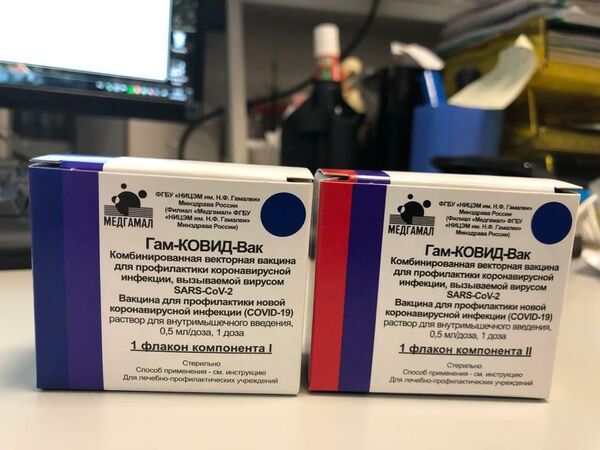
These adenoviral vector platforms enable rapid product development. We can quickly clone a gene of interest, in this case the gene encoding the S-protein of the coronavirus, the spike that forms the “corona” of the SARS-COV-2 coronavirus. This spike should be delivered to the body to form immunity. Gene synthesis and cloning it into a vector is the quickest part, while what I said before about studying the adenoviruses themselves, studying and producing adenovirus vectors, and creating technological platform takes decades. Therefore, it cannot be called a quick story. The quick story started from the moment we obtained a technology platform.
Sputnik: Other vaccines either use adenovirus 26 or 5, while the Russian vaccine used both. Could you explain how it works in more detail?
Denis Logunov: If you look at the national vaccination calendar, you will see that many vaccines are boosted: you inject the vaccine once, then once again, and again, and so on. Why? In order to form not only a high immune response, but also for this response to be prolonged, to form a reliable immunological memory. This is a general biological thing.
Therefore, you simply change the carrier vector to one that the immune response cannot recognise. Thus, you can input the desired gene unnoticed by the immune system, forming an immune response to the target antigen. That's the general idea. First and foremost, we were concerned about the immune response's effectiveness and duration, and prime-boost vaccination with various vectors being the best solution for this.
Sputnik: Your vaccine has obtained a temporary registration. What does that mean?
Denis Logunov: Why does temporary registration exist and why was this mechanism invented? We don't want to protect healthy volunteers for the next 1.5 years. We can recruit 40,000-50,000 healthy volunteers that don't fall into risk groups, those likely to get a mild form of the virus or not get infected at all. If the goal is to protect them, the criticism that a vaccine needs to be studied for a long time is justified.
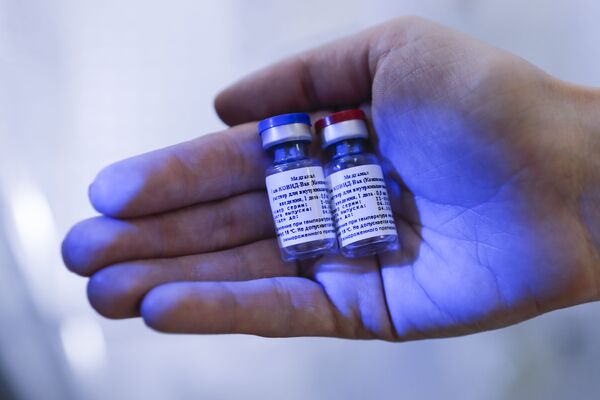
If we work with the ordinary population, where there are risk groups, people who either become disabled or die as the result of an infection, we need a mechanism that will allow the vaccine to be introduced in reasonable terms, under very strict conditions and restrictions. What do these strict conditions mean? This means that each tube is encoded with a QR code. There will be an app to record vaccine use in all hospitals, as well as to record all adverse effects in volunteers. Each vaccinated volunteer will be able to report on their health via the app.
I'd like to stress that we're not talking about forced mass vaccination, everyone makes their own decision regarding vaccination.
Sputnik: How many people will be involved in the third phase of testing?
Denis Logunov: The final figures are being approved at the moment, but I can say that the studies will involve about 30,000-40,000 people. The final version of the protocol hasn't been approved yet. There are ideas and there is an understanding of what this study needs to assess. One of the working options is that 2,000 people will be involved in clinical trials to assess immunogenicity parameters, and 28,000 volunteers will be involved in an observational study to assess epidemiological effectiveness. At the moment, we are still finalising the protocol to meet all norms, including international ones.
Sputnik: What is the difference between the various phases of clinical trials?
Denis Logunov: Russian law doesn't mention the concepts of the 1st, 2nd, and 3rd phases. This is a conditional definition used in international regulation. The first phase is safety assessment and is rarely carried out on its own. It can involve 2-8-10-15, sometimes 20 people. When studying vaccines, testing volunteers only for safety without analysing their blood for immunogenicity is a rather silly idea. Therefore, very often the first phase is accompanied with the second phase, which assesses not only safety, but also effectiveness.
I'd also like to add that you cannot start clinical trials without successfully completing a mandatory preclinical research programme.
These are extensive safety and immunogenicity studies in animals, without which you cannot start testing on humans. All the parameters are studied in a large number of species: rodents, lagomorphs, and monkeys. We did all this before the decision was made to start clinical research. At the same time, the USFDA says that well-researched platform technologies can undergo a special shortened preclinical testing procedure. Despite our platform being well studied, we successfully completed a full range of preclinical studies on two species of primates, lagomorphs, mice, rats, guinea pigs, and hamsters. In this case, we didn't follow the FDA's path. I don't know whether Johnson & Johnson, Moderna, and AstraZeneca have followed this path.
Sputnik: Why will the third phase of research be carried out after temporary registration?
Denis Logunov: The idea and meaning of temporary registration is to provide risk groups with access to the vaccine, thereby protecting people from severe complications or death from the infection. At the same time, the vaccine's civil circulation will be strictly controlled and the temporary registration can be suspended at any time.
The third phase is aimed at a large-scale assessment of safety and efficacy in a large number of volunteers as part of a controlled randomised study. It is necessary to obtain a lot of statistical data on all test parameters. Moreover, this stage is necessary for deciding on the vaccine's permanent registration.
Sputnik: The WHO representatives criticized you, saying that they hadn’t seen any scientific research. Do you somehow interact with the WHO representatives?
Denis Logunov: Generally, the practice is that we first provide the study results to the Ministry of Health experts. The goal was to get a safe and effective vaccine as quickly as possible – we’ve done that – and only then translate the data into English and write scientific papers. On the one hand, this doesn’t distract people from the task at hand; on the other hand, it doesn’t put pressure on the experts, analyzing the data we have obtained. When we publish something, we somehow say “look, we’ve published it, we are quoted and discussed, register us.” The decision to publish the data after it’s considered by the Ministry of Health allows for an unbiased examination.
Therefore, now that we have registered the drug, the article in English will be submitted to a reputable international journal in the coming days; it will be reviewed review by editors and reviewers. It won’t take one or two days; the process should take some time, but in any case, the material has been collected and we are going to publish it. Hopefully, the critics will have no ground in the near future.
Sputnik: During the vaccine development, did the Gamaleya Centre’s employees face any pressure on the part of various government institutions?
Denis Logunov: No, our authorities only offered help. I’d like to stress that when receiving a temporary certificate, the developer ends up in rather difficult conditions, and is strictly controlled from all sides. Therefore, there is no euphoria, like “hurray, we did it!” We need to work hard and produce a quality product; we have a great responsibility. And in pursuit of the number of doses, our priority is not to lose quality so that people get the good vaccine.
It’s stupid to pressure and ask to do more and better; it doesn’t work this way, everyone understands this. There are certain production capacities, there is a production load. To make it possible to produce mode doses of the vaccine, the President, the government, the Russian Direct Investment Fund (RDIF), the Head of our institute, Alexander Gintsburg, have done everything possible to provide funding to expand and increase production capacities. It is help, not pressure.
Sputnik: How do you plan to increase production capacity?
Denis Logunov: The vaccine’s mass production is expected to start in September 2020. Vaccine production is planned to reach 200 million doses by the end of 2020 if all production sites, including international ones, are involved.
For this, RDIF finances the launch of vaccine production on the basis of the production facilities of its portfolio companies, R-Pharm and Binnopharm, which is part of the Alium group.
Moreover, RDIF now sees the world’s huge interest in the vaccine and plans to carry out an independent third phase of clinical trials in various countries, including Saudi Arabia, the UAE, Brazil and the Philippines, as well as to launch mass production in several countries together with local sovereign wealth funds, including in India, South Korea and Brazil. In addition, they are considering the vaccine production possibilities in Saudi Arabia, Turkey and Cuba.
More than 20 countries have already expressed interest in getting Sputnik V, including the UAE, Saudi Arabia, Indonesia, the Philippines, Brazil, Mexico and India.
Sputnik: The Association of Clinical Trials Organizations (ACTO) criticized Gamaleya Centre’s scientists for allegedly injecting themselves with a prototype of their vaccine. They said that was a gross violation according to international standards. How do you respond to this criticism?
Denis Logunov: The centre’s scientists didn’t violate anything. It would be a violation if the scientists started catching volunteers on the street and, without their informed consent and insurance, injected them with the vaccine. If we did that, it would be exactly what ACTO was talking about. The developer has the right to inject themselves with what they develop, it is not regulated in any way; we did it not because we are heroes and want to become famous, but because people were working in the red zone, with a virus. All the plasma of Moscow’s COVID patients passed through us; we had to monitor these plasmas’ activity regarding the live virus, our employees were constantly under threat. Moreover, some people are elderly, some have concomitant diseases. The thing is there is an opportunity to protect the inner circle, there is a vaccine created with a comprehensively studied platform, each of us is confident in the probity of our own results and the results of our colleagues. We have many vaccines created with this technological platform, including registered ones, we didn’t expect any surprises. First of all, we tried to protect ourselves and our inner circle.
The Declaration of Helsinki doesn’t specify this at all; it regulates the procedure for conducting clinical trials. We were not conducting clinical research at that time. All their claims would be justified if we were conducting clinical trials, recruiting people, vaccinating them and adding that data to the clinical trials dossier. That would be a violation. However, none of that happened, so it’s just a cheap substitution of notions.
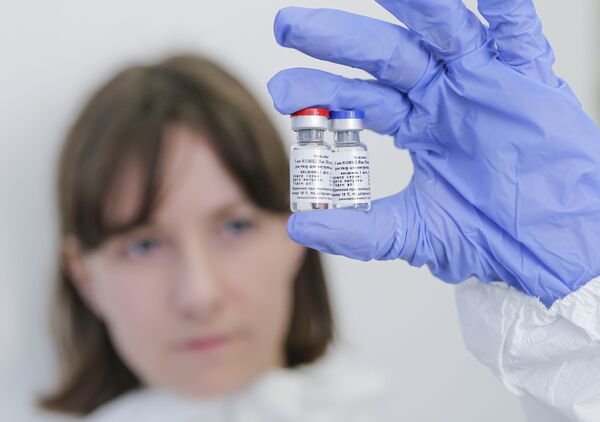
Sputnik: Could you tell us about the tests, identifying the most effective coronavirus antibodies? What makes this technology unique? What are your plans for these tests? Will they receive an international patent?
Denis Logunov: The test is based on ELISA (enzyme-linked immunosorbent assay) system, developed at Gamaleya Centre by Dmitry Shcheblyakov and his laboratory. The test is based on identifying antibodies to the receptor-binding domain of the coronavirus’ S-protein. The thing is that the overwhelming majority of virus-neutralizing antibodies, antibodies that are capable of directly inactivating the virus, are formed precisely to this receptor-binding domain. With this test, you can determine with a high probability that the blood serum has a virus-neutralizing activity through the ELISA reaction, without experimenting with a live virus. This greatly simplifies the matter, since the virus neutralization reaction takes 5 days, while with this test you can select highly active sera or, in case of transfusion, highly active plasma in a day, even in a few hours under in the context of primary screening. You can quickly preserve this plasma, not losing the donor for 5 days. Then you can test samples for the neutralization reaction in a laboratory that provides for working with a live virus, and confirm that this plasma or serum is active. This applies to immunization as well; you can see how many of the total pool of antibodies formed in the body will be active in neutralizing the virus.
Sputnik: What is the ratio of antibody level between those who were vaccinated and those who have had coronavirus? What does this ratio mean?
Denis Logunov: Throughout the world, serum activity levels in convalescents, people who have had coronavirus, are now being compared to those in immunized volunteers. There is a rather significant difference in favour of the vaccinated since there is no body intoxication during immunization; there is no serious illness, so it’s not surprising that the level of antibodies is higher in the vaccinated than in those who have recovered. We already know that antibodies appear in many people who have had coronavirus, but they don’t last long; it is much more reliable with vaccination.
Sputnik: Can people who have had coronavirus be vaccinated? Might any undesirable effects occur?
Denis Logunov: For me there are absolutely no problems in this sense. Every year we are revaccinated against the flu, while we get sick with it. No one asks if there is a problem. If you have had the flu this year, you can get immunised next year. These questions originate from the notorious ADE-effect (Antibody-dependent enhancement, a phenomenon where the binding of a virus to suboptimal antibodies enhances its entry into host cells). There is a lot of talk about this phenomenon now, but in fact, speaking of SARS and SARS-CoV-2, there’s no such enhancement after vaccination with a vector vaccine. If we're talking about vector vaccines, all the vaccinated survive and don't get sick, while all unvaccinated animals die or have their lungs much more damaged than the vaccinated ones.
Therefore, with vector vaccines, there is no question of any ADE effect in a pure form, which would tun into a respiratory disease. This doesn’t mean that this effect doesn’t need to be studied and watched. In fact, developers must track their vaccine every time in a variety of situations and for a variety of indicators, including this one. This should be treated carefully. However, today, this ADE story is over-exaggerated. It is inactivated vaccines, not vector ones, that have shown the lung eosinophilia effect (an increase in the number of immune cells, leading to a so-called cytokine storm). This is a different type of vaccine.
Even animals immunised with the inactivated vaccine survived. They had eosinophilia, they were sick, but they survived. The control animals were also sick, but died. Therefore, what kind of respiratory infection enhancement can we talk of here? Animals are protected in the experiment and are not protected in the control group. If there were no other vaccine and I were asked if I wanted to get immunised but I would have mild pulmonary eosinophilia, I would choose eosinophilia.
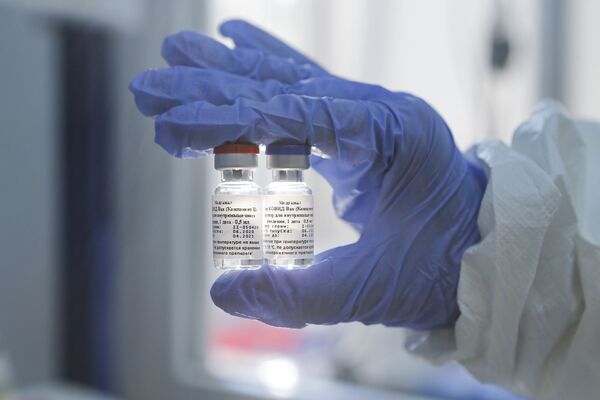
Therefore, this is a rather contrived story. Since vector vaccines haven’t shown this at all, exaggerating and turning it into some kind of global problem is more like hyping. This is true in the case of the Dengue fever vaccine and other fevers. But this hasn’t been shown for the coronavirus; millions of people have already had it, but no cases of the ADE effect were found. There is no such thing that people who have recovered got sick again and died, as was with the Dengue fever. You should pay attention to the ADE effect; it should be tracked, for all vaccines, not only for the coronavirus, but for all respiratory infections. But saying that this is a huge problem, and that there is an ADE effect and therefore there will never be a vaccine is stupid. I haven’t seen a single evidence-based scientific article on this issue.
Sputnik: How would you respond to the criticism that your vaccine’s antibody titer is very low?
Denis Logunov: This is either a misuse of terminology or just a substitution of notions. The titers are huge, almost 1 in 15,000. The media have confused the virus-neutralisation titer with the antibody titer. All the titers are indicated in the instructions. What is there to comment on if people don’t see the 1 in 15,000 titer and say that it’s 1 in 50? I could argue if they said that 15,000 is not enough. But what is there to comment on here if this is just a fraud and distortion of information?
Sputnik: Are there any methodological differences in the third phase of clinical trials in various countries that international analysts overlook when talking about the Russian vaccine?
Denis Logunov: We are going to do everything according to Russian law. I’m not really worried that someone will say that something is wrong with our vaccine. Anyway, there will always be someone who will say that. In Russia, all clinical trials are conducted in accordance with Federal Law No. 61. Not a single expert who lives in Russia will accept the results if they have been obtained with violations. Moreover, even minimal protocol deviations are identified by experts and recorded; the study can be recognised as invalid and blocked. Developers can be held accountable, depending on the scale of these violations. We work in the legal field and carry out expertise in accordance with Russian laws. If someone doesn’t like Russian laws, it’s not our problem.
Sputnik: Commentators point to international standards, and it would be interesting to know how this works in other countries developing these vaccines. Do they comply with the standards and laws of their own countries or with these international standards, which everyone is imposing on Russia?
Denis Logunov: In fact, all standards are more or less harmonised. It’s clear that many states protect their markets and manufacturers; there are conditions for foreign drug registration on their territory. In this case, Russia is not following a special path. We are following the Helsinki Declaration. The criticism usually concerns government decree No. 441, which allows registration under strict conditions. We have already spoken about why registration is allowed and under what conditions. All the criticism boils down to criticising this point and the government decree. But I think this is a very good decree. In fact, what it does is not untie, but tie the hands of producers, bringing them under strict control, at the same time giving them certain freedom. Therefore, I don’t see any problem here. If someone wants to criticize this government decree, it’s great. It’s probably good that there is a different opinion in the world.
Sputnik: Did only Russian scientists take part in the vaccine creation, or were any foreign colleagues involved in it?
Denis Logunov: This particular vaccine was only developed by the Gamaleya Centre; we didn’t collaborate with any foreign colleagues. But the technology is a huge layer of knowledge and scientific experience. Of course, a lot of people work with it throughout the world, there are lots of publications; we read these publications, they read ours, this is a common scientific field. A lot of research has been done before us and not by us. Of course, we used all the publicly available scientific results in this area. But, the vaccine development, its creation and scaling was only carried out by Russian scientists.
